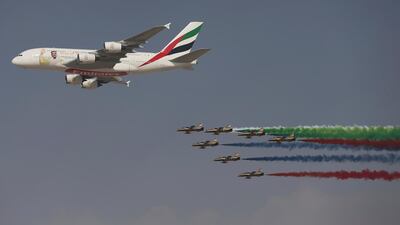The Dubai Airshow opens on Sunday against a backdrop of Boeing's ongoing 737 Max grounding, industry woes and a slow global economy – though Gulf defence manufacturing capabilities and future technology are expected to be the focus.
The biennial civil and military expo running from November 17 to 21, previously the stage for record-setting mega-deals, is set this year against weak demand from regional airlines rethinking fleet and growth strategies while suppliers are grappling with jet delivery delays and engine glitches, experts say.
This year's air show will comparatively "likely be smaller, due to ongoing transformation of large airlines in the region, the Boeing saga and the reliability issues with Rolls-Royce engines", said Diogenis Papiomytis, Frost and Sullivan's global programme director for commercial aviation. "Boeing will need to produce a clear road map, not only for the Max but also wide-body aircraft, a support programme for re-entry into service and for new Max deliveries."
Aviation executives descending on Dubai this week at the top industry event will be watching Boeing's efforts to reassure airlines, pilots and, ultimately travellers, of the embattled jet's safety. The now eight-month global ban on the Max following two deadly crashes shook the industry, dented Boeing's earnings, hurt airlines' operations and profitability and raised questions on jet certification procedures.
The US plane maker is heading to the Dubai Airshow with the intention of talking to customers about the 737 Max return to service, Ihsanne Mounir, Boeing's vice president of commercial sales and marketing, said in Seattle last month.
Flydubai, the UAE's only Max operator and the second-biggest Max customer after Southwest Airlines in the US, has said its fleet shrank to 2014-levels after the grounding and is in talks with Airbus for a potential order of the competing A320Neo model.
Boeing's shares surged earlier this month as investors cheered an imminent upturn in events when the company said it expects FAA certification of the Max this quarter and commercial service to resume in January.
Mr Mounir said the company is in "advanced" talks with airlines for new 737 Max purchases following the vote of confidence by British Airways owner IAG that intends to buy 200 of the single-aisle jets.
"I think it will be hard for Boeing to win new orders at the show given where the Max is in its re-certification process. Boeing will focus on reassuring existing customers, especially FlyDubai that has 237 Maxes on order and 14 in storage," George Ferguson, senior aerospace analyst at Bloomberg Intelligence said. "Most new customers probably need to see the Max fly and customer acceptance before ordering.
The Dubai Airshow will test demand for overall aircraft orders as weakening global growth has taken its toll on the aviation industry.
Regional giants Emirates and Etihad Airways are rethinking their plane requirements and route networks amid challenges to their "super-hub" model. They are shifting towards "right-sizing" their fleet after grabbing headlines with mammoth wide-body orders in the past 10 years. The demand for more jets has been hurt by lower oil prices, uncertainty from the US-China trade dispute, geopolitical tensions and a deteriorating global economy. The industry continues to witness flagging air cargo volumes and sluggish passenger demand as a result of a challenging macroeconomic backdrop.
"The Gulf carriers face big challenges, now that the days of spectacular growth rates are in the past. The challenge now is to right-size the fleet, to focus on profitable premium passengers, and new, thinner routes," Richard Aboulafia, aerospace analyst at Teal Group, said.
Sharjah's Air Arabia is widely expected to place an order for about 100 narrow-body planes, most likely with Airbus, for growth and replacement in its fleet as well as a new deal with Etihad Airways to establish a low-cost airline in Abu Dhabi.
Emirates, which typically makes headlines at its local air show, still needs to sign off on a final order for Airbus A350 and A330 Neo jets. Also pending is a $15 billion (Dh55bn) commitment for 40 Boeing 787 Dreamliners and a possible reshuffle in an order for the delayed 777X.
Emirates president Tim Clark has repeatedly expressed his growing frustration with plane manufacturers and engine makers over delayed deliveries, warning them that he will refuse deliveries that don't meet reliability expectations.
The Dubai Airshow will provide a platform for jetmakers to address customer concerns about these delays, as they seek to ramp up their book-to-bill ratio.
Aside from commercial deals, the Gulf's defence manufacturing sector is also expected to come to the forefront as regional governments boost efforts to diversify their economies away from oil and develop local military industries.
The UAE earlier this month announced the creation of Edge, a new defence conglomerate for developing advanced technology for weapons systems, cyber protection and electronic warfare.
It will form partnerships with global equipment makers and defence contractors to speed up innovations against cyber attacks, drones, the spread of misinformation and other threats to security in the UAE and abroad.
"I expect Middle East and UAE aerospace manufacturing and defence sectors to gather a lot of headlines, possibly more so than airline orders," Mr Papiomytis said.
A major focus at the air show this year will be companies showcasing technology reshaping the future of flight and transportation.
"Electric aircraft, urban air mobility, digital solutions and impact of technologies — Big Data & AI, Blockchain, Automation — in manufacturing and the aftermarket will be themes at the air show," he said.
Autonomous flight and drones capable of safe human transportation will take centre stage at the 2019 air show, with discussions about striking a balance between the technology and regulations that will allow flying vehicles to operate at heights of up to 200 feet, Mark Martin, founder of aviation consultancy Martin Consulting, said.


